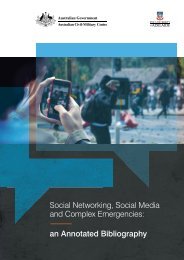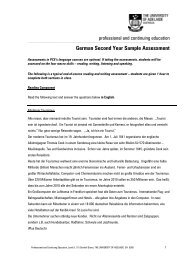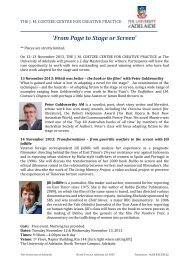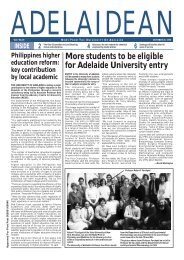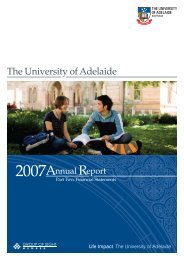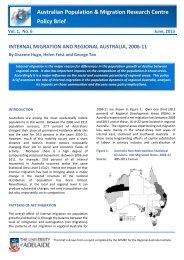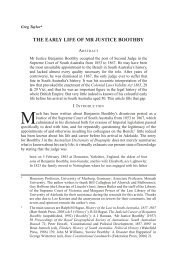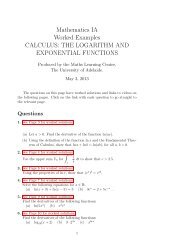Unbridling the Tongues of Women - The University of Adelaide
Unbridling the Tongues of Women - The University of Adelaide
Unbridling the Tongues of Women - The University of Adelaide
You also want an ePaper? Increase the reach of your titles
YUMPU automatically turns print PDFs into web optimized ePapers that Google loves.
Edging out <strong>of</strong> <strong>the</strong> domestic sphere<br />
that none <strong>of</strong> <strong>the</strong> children in <strong>the</strong> Asylum could even dress <strong>the</strong>mselves; <strong>the</strong> nurses found<br />
it less trouble to do it for <strong>the</strong>m than to teach <strong>the</strong>m how to look after <strong>the</strong>mselves. Clark<br />
remarked, ‘when we remember that <strong>the</strong>se children were to be sent out as little servants<br />
to help o<strong>the</strong>rs when <strong>the</strong>y could not help <strong>the</strong>mselves, it may be imagined how useless<br />
<strong>the</strong>y would be’. Clearly, Clark had taken over, wholesale, <strong>the</strong> ideology informing <strong>the</strong><br />
philanthropic groups pressing for boarding out in Britain: pauperism threatened <strong>the</strong><br />
social order; paupers must be transformed into docile and industrious workers, in<br />
this case into domestic servants. She formed a Boarding-Out Society and headed a<br />
deputation, which included Ca<strong>the</strong>rine Spence, to persuade <strong>the</strong> government to supply<br />
allowances for <strong>the</strong> children whom <strong>the</strong> Society would board out. 27<br />
She achieved only half her aim in 1866. Blyth’s government agreed with her<br />
that <strong>the</strong> children should be separated from <strong>the</strong> adult destitute; it acknowledged that<br />
boarding out was an excellent system, but refused <strong>the</strong> Boarding-Out Society’s request<br />
and proceeded to pass legislation almost identical to Victoria’s Neglected and<br />
Criminal Children’s Act <strong>of</strong> 1864. This, following precedents in Britain, provided for<br />
building government industrial schools and reformatories, but not for boarding <strong>the</strong><br />
children with members <strong>of</strong> <strong>the</strong> community. 28 She had to wait six more years, until<br />
1872, to achieve <strong>the</strong> rest <strong>of</strong> her aim. Faced with overcrowding in <strong>the</strong> new industrial<br />
school, and recognising <strong>the</strong> precedent established in 1870 by <strong>the</strong> English Poor<br />
Law Board, <strong>the</strong> South Australian Parliament passed <strong>the</strong> Destitute Persons’ Relief and<br />
Industrial and Reformatory Schools Act, 1872: it was a piece <strong>of</strong> portmanteau legislation<br />
demonstrating how similar poverty and crime, or at least juvenile crime, were<br />
thought to be. This Act permitted boarding out. 29<br />
However, <strong>the</strong> legislation was less a triumph for <strong>the</strong> Boarding-Out Society than a<br />
recognition that after six years <strong>of</strong> disastrous maladministration, action <strong>of</strong> some kind<br />
was urgent. Indeed, action had been urgent for most <strong>of</strong> those years. In November<br />
1866 <strong>the</strong> children in <strong>the</strong> Destitute Asylum had been removed, to provide barracks for<br />
two companies <strong>of</strong> <strong>the</strong> Fourteenth Regiment returning from <strong>the</strong> war against <strong>the</strong> Maoris.<br />
30 Over 100 children were lodged in <strong>the</strong> Exhibition Building for several months,<br />
so ‘seriously deficient in <strong>the</strong> most ordinary appliances <strong>of</strong> cleanliness and decency;<br />
that <strong>the</strong>ir health rapidly declined … very many <strong>of</strong> <strong>the</strong> children presenting a squalid<br />
and emaciated appearance’. <strong>The</strong>y were moved to a house called <strong>the</strong> Grace Darling at<br />
Brighton. It was large enough for only a third <strong>of</strong> <strong>the</strong>ir number; it needed repairs; <strong>the</strong><br />
matron was harassed not only by lack <strong>of</strong> space and assistance, but also by difficulties<br />
in getting her requisitions attended to by <strong>the</strong> new Destitute Board, and by its chair-<br />
83



